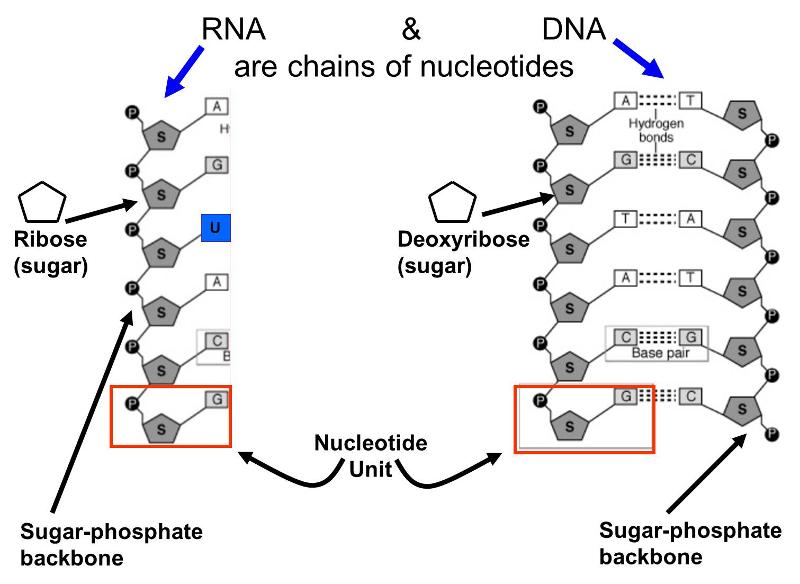Biochemistry answers to weight loss questions: Where does the weight go?
Replies
-
Oh and as a side note as you study biochemistry you start noticing that nature is kinda lazy and keeps reusing the same pieces in all of its biochemicals.
ADP is adenine (one of the four bases in DNA)
connected to ribose (a sugar) as in the R in RNA (ribonucleic acid)
With some phosphates stuck on the end....phosphates also being in DNA and RNA
So the adenine connected to the ribose connected to a phosphate is in RNA already:
So basically all ATP is is an RNA nucleotide (which all life has in its cells in abundance) with two more phosphates tacked on the end.
The bond in the connection between the second and third phosphate is particularly high energy and easily broken so it makes a good energy storage molecule. The components are just lying around anyways so may as well use those.
Every single lifeform on the planet uses ADP+P <> ATP for energy storage and transfer6 -
Thank you for this suitable for simple hamsters answer Aaron

Now if anyone knows how you can get the link to this thread copied out of the Android app (without resorting to loading the web version of the site)... 1
1 -
Thank you for this suitable for simple hamsters answer Aaron

Now if anyone knows how you can get the link to this thread copied out of the Android app (without resorting to loading the web version of the site)...
Don't know if you can just copy the link from this post from your phone but if so here it is:
http://community.myfitnesspal.com/en/discussion/10650701/biochemistry-answers-to-weight-loss-questions-where-does-the-weight-go/p10 -
Aaron_K123 wrote: »Thank you for this suitable for simple hamsters answer Aaron

Now if anyone knows how you can get the link to this thread copied out of the Android app (without resorting to loading the web version of the site)...
Don't know if you can just copy the link from this post from your phone but if so here it is:
http://community.myfitnesspal.com/en/discussion/10650701/biochemistry-answers-to-weight-loss-questions-where-does-the-weight-go/p1
Kitten android app: nope!
But! But: if you quote the response... you CAN copy from the editor!!!!!
Which means that I can now make a short link, woohoo!!!!
https://v.gd/ebenoy
0 -
Aaron_K123 wrote: »Thank you for this suitable for simple hamsters answer Aaron

Now if anyone knows how you can get the link to this thread copied out of the Android app (without resorting to loading the web version of the site)...
Don't know if you can just copy the link from this post from your phone but if so here it is:
http://community.myfitnesspal.com/en/discussion/10650701/biochemistry-answers-to-weight-loss-questions-where-does-the-weight-go/p1
Kitten android app: nope!
But! But: if you quote the response... you CAN copy from the editor!!!!!
Which means that I can now make a short link, woohoo!!!!
https://v.gd/ebenoy
What did you need the link for if you don't mind me asking?0 -
To link to someone not on MFP!
If you have the option to cut and paste the post in a text message or send a link which one would you rather receive?!?!
And then you have Fitbit where the iPhone app doesn't allow someone to click on a link posted by an Android phone when posted inside a weekly challenge chat.
So now the other person has to write or remember the link because you can't even cut and paste from the chat!
Hence the "pronounceable" option using the "very good" v.gd people which reduces the whole thing to ebenoy
1 -
Not that I doubted this at all it is repeated on CNN today according to Big Fat Myths: When You Lose Weight, Where Does the Fat Go? which is an interesting perspective on "diet" 148oz / 9.25 lbs of food/water/oxygen a day but depending on how efficient everything processes we don't operate on a perfect 24 hour cycle to use all that so you get those fluctuations. I think that is semi comforting to keep in mind we are not robots and CICO doesn't operate at perfect 24 hour scale either.2
-
Thanks so much for explaining this as I have always wondered how it all works.0
-
sschauer513 wrote: »Not that I doubted this at all it is repeated on CNN today according to Big Fat Myths: When You Lose Weight, Where Does the Fat Go? which is an interesting perspective on "diet" 148oz / 9.25 lbs of food/water/oxygen a day but depending on how efficient everything processes we don't operate on a perfect 24 hour cycle to use all that so you get those fluctuations. I think that is semi comforting to keep in mind we are not robots and CICO doesn't operate at perfect 24 hour scale either.
That seems like a surprisingly reasonable and understandable article for a mainstream news source. @Aaron_K123 or @PAV8888, I’d be curious of your takes on that CNN article. I think it might be handy to add to my link library.0 -
I just pictured chunks of potatoes "flying" out of my mouth as I ran up the hill.
 2
2 -
Co-author on that article is the Ruben that has the youtube video discussion of the same. So no wonder it's good.
But still good of CNN to keep what he said. https://youtu.be/vuIlsN32WaE
https://youtu.be/vuIlsN32WaE
0 -
Swoon-y good, Aaron, yet again! Any time you feel inspired to contribute this sort of thing, I want to read it. Thanks!1
-
sschauer513 wrote: »Not that I doubted this at all it is repeated on CNN today according to Big Fat Myths: When You Lose Weight, Where Does the Fat Go? which is an interesting perspective on "diet" 148oz / 9.25 lbs of food/water/oxygen a day but depending on how efficient everything processes we don't operate on a perfect 24 hour cycle to use all that so you get those fluctuations. I think that is semi comforting to keep in mind we are not robots and CICO doesn't operate at perfect 24 hour scale either.
Huh well look at that, I'm impressed. It is so rare for major media outlets to get something right on a science front...usually they go either full-woo or they sensationalize or misrepresent something. This seems pretty accurate. Not only that it is pretty well written, getting in some other info I glossed over with a smaller word count.
I noticed the article is credited to a scientist not a journalist so that makes sense then. No offense to journalists but they are typically really bad at conveying science to the public.6 -
MegaMooseEsq wrote: »sschauer513 wrote: »Not that I doubted this at all it is repeated on CNN today according to Big Fat Myths: When You Lose Weight, Where Does the Fat Go? which is an interesting perspective on "diet" 148oz / 9.25 lbs of food/water/oxygen a day but depending on how efficient everything processes we don't operate on a perfect 24 hour cycle to use all that so you get those fluctuations. I think that is semi comforting to keep in mind we are not robots and CICO doesn't operate at perfect 24 hour scale either.
That seems like a surprisingly reasonable and understandable article for a mainstream news source. @Aaron_K123 or @PAV8888, I’d be curious of your takes on that CNN article. I think it might be handy to add to my link library.
@MegaMooseEsq It looks accurate to me...and I agree, surprising for a media outlet. They typically suck at conveying anything scientific.
It also goes into some more detail, that chart of "Everything you eat and where it all goes" is quite nice. One thing it leaves out is that some of your food mass is not digestable and is excreted in feces but as I said in my post that isn't really technically "in" you ever, it is just passing through you.
But yeah, people have the mistaken idea that all of the "weight" is in the food when in fact food is a small percentage of mass exchange in your body, most is water and air.2 -
Nice article it looks. Seems reasonable enough so far! No quivering alert antennas. But I note Moose that my biochemical understanding would be just enough to.... fail to meet the pre-requisites for the introduction to biochemistry for art majors course Aaron would be forced to teach as a penance for ticking off the Dean during a meeting!
 2
2 -
Nice article it looks. Seems reasonable enough so far! No quivering alert antennas. But I note Moose that my biochemical understanding would be slenough to fail to meet the pre-requisites for the introduction to biochemistry for art majors course Aaron would be forced to teach as a penance for ticking off the Dean during a meeting!

Well the joke is on that Dean then because I actually like explaining this stuff to people who aren't familiar with it. Plus both my parents are humanities types so I'm used to that....my mom is a poet and my dad sells books.7 -
Interesting discussion.
I barely got a C in biochem in college but this info confirms most of what I believed about how the body makes use of the food we eat and store in our body.
The surprise for me was that all of it, except for the fiber and otherwise undigestable parts that are excreted and the excess that is retained as glycogen or fat, is expelled as CO2 and H20.
Does this explain why I pee so much? LOL!
1 -
Aaron_K123 wrote: »MegaMooseEsq wrote: »sschauer513 wrote: »Not that I doubted this at all it is repeated on CNN today according to Big Fat Myths: When You Lose Weight, Where Does the Fat Go? which is an interesting perspective on "diet" 148oz / 9.25 lbs of food/water/oxygen a day but depending on how efficient everything processes we don't operate on a perfect 24 hour cycle to use all that so you get those fluctuations. I think that is semi comforting to keep in mind we are not robots and CICO doesn't operate at perfect 24 hour scale either.
That seems like a surprisingly reasonable and understandable article for a mainstream news source. @Aaron_K123 or @PAV8888, I’d be curious of your takes on that CNN article. I think it might be handy to add to my link library.
@MegaMooseEsq It looks accurate to me...and I agree, surprising for a media outlet. They typically suck at conveying anything scientific.
It also goes into some more detail, that chart of "Everything you eat and where it all goes" is quite nice. One thing it leaves out is that some of your food mass is not digestable and is excreted in feces but as I said in my post that isn't really technically "in" you ever, it is just passing through you.
But yeah, people have the mistaken idea that all of the "weight" is in the food when in fact food is a small percentage of mass exchange in your body, most is water and air.
That chart stood out to me as well. I always appreciate a good graphic.Nice article it looks. Seems reasonable enough so far! No quivering alert antennas. But I note Moose that my biochemical understanding would be just enough to.... fail to meet the pre-requisites for the introduction to biochemistry for art majors course Aaron would be forced to teach as a penance for ticking off the Dean during a meeting!
That might be the case, but you've still fooled me into thinking you seem like the reasonable type whose opinion is worth paying attention to. 3
3 -
This is awesome. I'm also developing a crush on Aaron.
 4
4 -
Co-author on that article is the Ruben that has the youtube video discussion of the same. So no wonder it's good.
But still good of CNN to keep what he said. https://youtu.be/vuIlsN32WaE
https://youtu.be/vuIlsN32WaE
Yeah that TED talk explaining it is pretty good.1 -
Well... This is cool and all... But I'm still gonna weigh after a really good poop. Cuz... #progress
Hahaha1 -
this was really interesting. what I find fascinating is that there are people who think this piece of molecular machinery came together by accident.4
-
Binkie1955 wrote: »this was really interesting. what I find fascinating is that there are people who think this piece of molecular machinery came together by accident.
Not accident. Creeping incrementalism.
Only question is whether someone/something pushed the first domino.
2 -
Binkie1955 wrote: »this was really interesting. what I find fascinating is that there are people who think this piece of molecular machinery came together by accident.
Evolution through natural selection is not "accident" my creationist friend. No one says that biochemistry came about randomly by accident, that is a total strawman not to mention off-topic.5 -
Hey Aaron, thanks for this post. I understood enough to get that there are scientific reasons for consuming less than you expend and that exercise contributes to that expenditure. Maybe this will help me meet my goals and also exercise more!
 0
0 -
Is the simple answer
1. Maintain calories at metabolic rate
2. Increase heart rate, breathing as frequently as possible.
Long term improve vo²
???0
Categories
- All Categories
- 1.4M Health, Wellness and Goals
- 398.1K Introduce Yourself
- 44.7K Getting Started
- 261K Health and Weight Loss
- 176.4K Food and Nutrition
- 47.7K Recipes
- 233K Fitness and Exercise
- 462 Sleep, Mindfulness and Overall Wellness
- 6.5K Goal: Maintaining Weight
- 8.7K Goal: Gaining Weight and Body Building
- 153.5K Motivation and Support
- 8.4K Challenges
- 1.4K Debate Club
- 96.5K Chit-Chat
- 2.6K Fun and Games
- 4.8K MyFitnessPal Information
- 18 News and Announcements
- 21 MyFitnessPal Academy
- 1.5K Feature Suggestions and Ideas
- 3.2K MyFitnessPal Tech Support Questions













